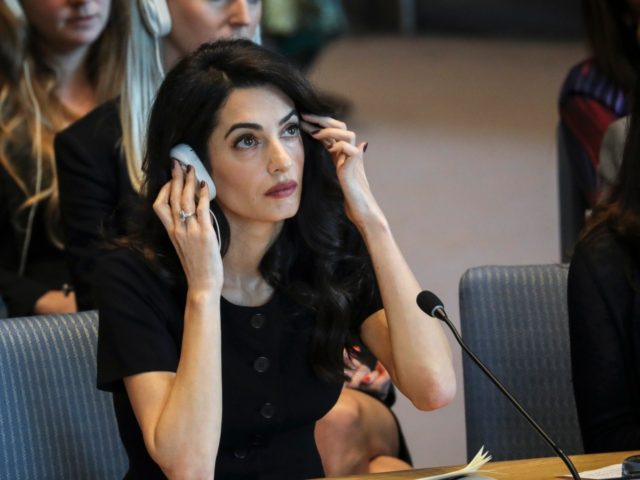Philippine President Rodrigo Duterte’s legal counsel Salvador Panelo told reporters Tuesday he was “excited” to face off against Amal Clooney, representing the founder of media outlet Rappler, Maria Ressa, stating Ressa chose her because she is “not only beautiful but also sexy.”
Ressa, one of Time magazine’s 2018 people of the year, is facing a litany of charges she says are meant to intimidate other journalists into being silent about Duterte’s war on illegal drug trafficking, including tax evasion, allowing foreigners to own shares in a media company (a crime in the Philippines), and “cyber libel,” a crime that did not exist when the alleged offense occurred.
Ressa announced Tuesday that Clooney, who also worked on the case against two Reuters journalists in Myanmar, would represent her on all the cases, praising her as someone “who really respects journalists.”
Clooney will face Panelo, more commonly known as Duterte’s press secretary. Panelo said he was “excited” to work with her.
”I’m excited to debate with her,” Panelo said, in a mix of English and Filipino, according to the Inquirer. “I guess they are just looking for my match. Because when I and Maria go on a debate, pity her, she is not even a lawyer. She needs a lawyer, not only beautiful but also sexy.”
Panelo said Clooney was “welcome to defend Maria,” but called her “misinformed.”
“Maybe if we meet I can, to use the words of the President, ‘educate her,'” Panelo reported added, dismissing a question asking if Clooney’s involvement is a sign that the international community sides against Duterte on the Rappler case.
Speaking to the Agence France-Presse (AFP) Tuesday, Ressa expressed optimism about her case because of the quality of her legal team, which she called “legal luminaries, like the Justice League.”
“It’s like bringing together a think tank of legal minds,” she said. “As journalists, we work for justice, and having this team now makes me feel like there has got to be some justice. We’ll do our best to get it.”
Ressa lamented that the government had implicated her in so many cases, “I can spend four days on a given week in court” attending hearings, a strategy she called “harassment.”
Duterte has denied any personal involvement in Ressa’s legal woes.
Clooney issued a statement announcing her new role on Ressa’s legal team.
“Maria Ressa is a courageous journalist who is being persecuted for reporting the news and standing up to human rights abuses. We will pursue all available legal remedies to vindicate her rights and defend press freedom and the rule of law in the Philippines,” Clooney’s statement read.
Human rights advocates told AFP that Clooney may help draw attention to the case.
“I think it’s good that Ressa is getting such high-profile advocates,” Carlos Conde, a researcher for Human Rights Watch in Asia, told the news agency. “This raises the issue that her case represents to an even higher level – the better to make the public aware not just about what’s happening to her and Rappler but about the erosion of press freedom and the constriction of democratic space in the Philippines.”
Ressa has been arrested twice this year for running Rappler, a current events and news site that regularly, and critically, covers the Duterte government. The arrests followed Time naming her, and other persecuted journalists, their persons of the year. In February, police arrested Ressa for “cyber libel” over an article accusing Wilfredo Keng, a wealthy and influential Filipino-Chinese businessman, of having ties to drug traffickers – a potential death sentence under Duterte, who has enthusiastically advocated for extrajudicial killings of drug suspects. The article was published in May 2012, four months before the federal legislature passed the “cyber libel” law.
“I do not know Keng. Frankly, I do not know him or what prompted him to file a case, Duterte said following Ressa’s arrest. “I really don’t know about it. Not for today … I was out the whole day.”
In March, police arrested Ressa, who was out on bail, again, this time for allegedly allowing foreigners to take ownership in Rappler. Authorities also charged Ressa with securities fraud during this arrest. She is also facing several previous charges of tax evasion, which she denies. It is illegal in the Philippines for foreigners to own or administer news organizations, as per a 1976 presidential decree. Duterte has accused Rappler of being American-owned in the past.
“Obviously, this is yet another abuse of my rights. I am being treated like a criminal when my only crime is to be an independent journalist,” she said at the time. “Every action takes us farther into a descent into tyranny. This is the weaponization of the law.”
The U.S. Embassy in Manila expressed hope that the legal persecution of Ressa would cease following her February arrest.
“We hope the charge against journalist and Rappler CEO Maria Ressa will be resolved quickly in accordance with relevant Philippine law and international standards of due process,” the embassy said in a statement on Twitter.

COMMENTS
Please let us know if you're having issues with commenting.